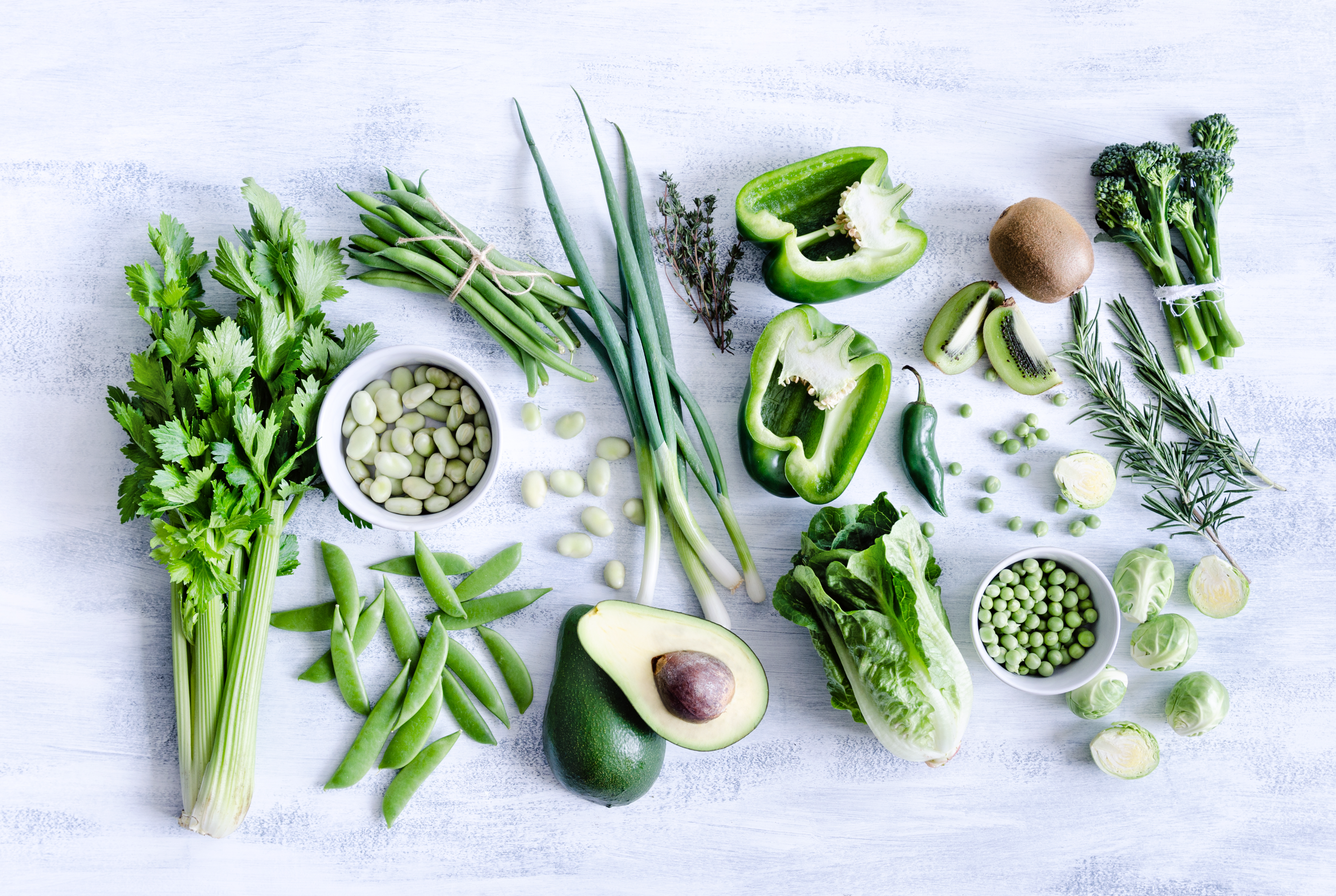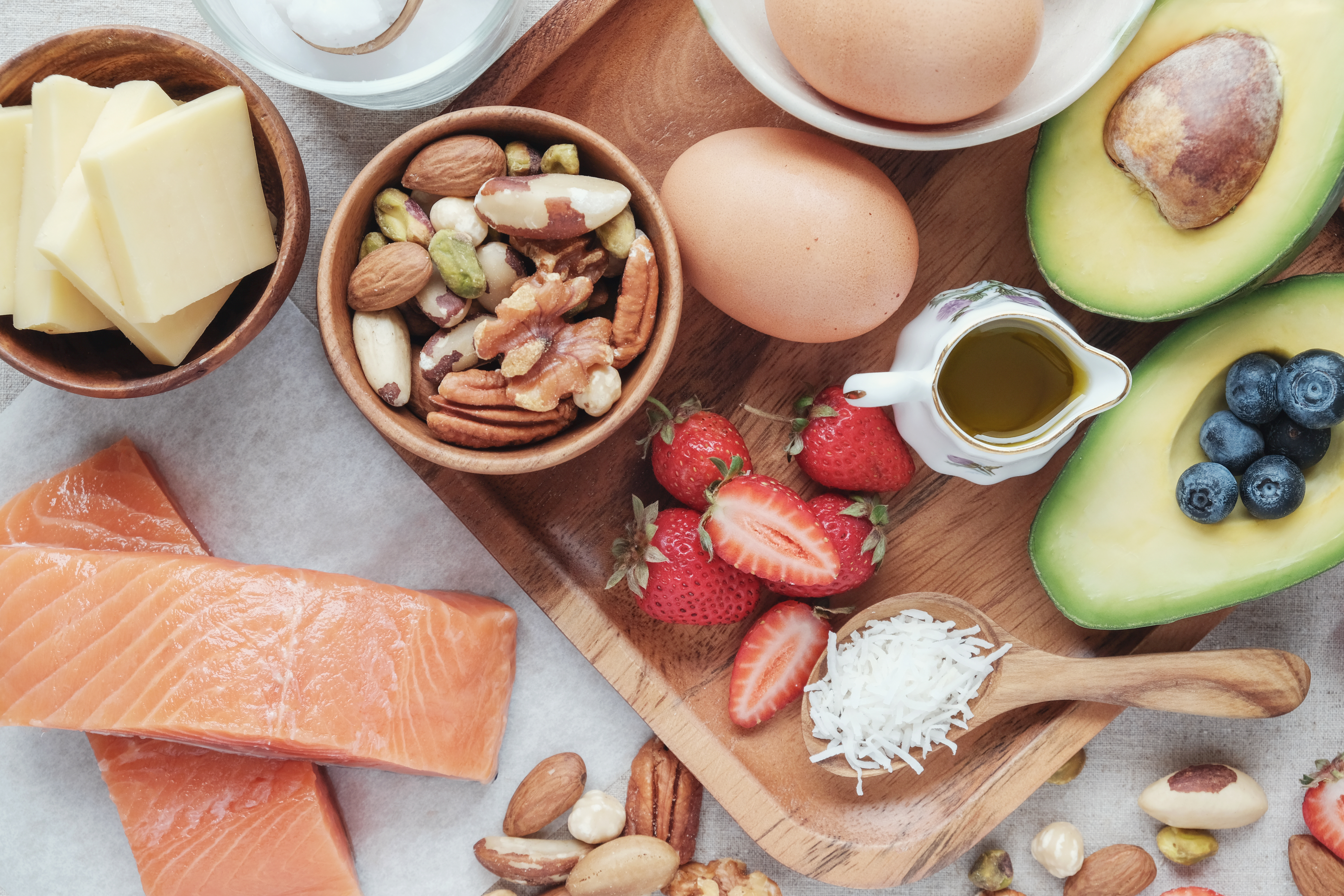

Ketogenic Diet
Keto:
You need base on your case plan for... calories a day.
The body has two fuel choices: glucose and fats. Ketones are a fuel made when you burn fat. If you reduce your sugar and carbs, your body will burn fat and ketones. On a low-fat diet, your body will burn carbs, which won’t allow you to tap into your fat reserves. But when you go on a low-carb diet, the body is forced to use body fat. The key is to focus on reducing carbohydrates and not fat. You can also trigger ketones with fasting. This is one reason why Its recommended to combine keto with intermittent fasting, but there are some other important reasons too.
Keto is the type of eating that naturally allows your body to work like it was designed to work. Ketones are actually the body’s preferred fuel. Very few people who try to lose weight are burning their fat and ketones.
Just the fact that your body has a very tiny glucose storage supply compared to a massive fat reserve will tell you that your body was designed to use fats and ketones as primary fuel. Use this fuel tanker as an example: Here’s a truck with so much potential fuel, but it's unavailable to the truck. The truck is only relying on a small tank of gas. Keto allows you to tap into the huge fuel storage.
Intermittent fasting:
Intermittent fasting is as simple as it sounds: fasting intermittently. Rather than having many small meals from the time you wake up until the time you go to sleep, the goal of intermittent fasting is to have fewer meals and to have them within a smaller window. If you have your first meal of the day at 1:00 p.m. and your next (and last) meal at 5:00 p.m., this gives your body 20 hours of fasting, ( but if can’t u can start with 3 meals).
Top Benefits of Going Keto:
• Autophagy (recycling old and damaged proteins)
• Increases growth hormone
• Reduces inflammation
• Heals the digestive system
• Removes cravings or hunger
• Improves heart health
• Improves brain health
• Increases antioxidants in the body
• Reduces risk of cancer and tumors
• Increases mitochondria
• Increases stem cells
• Increases immune function
• Improves sleep
• Improves the hippocampus, the GPS of the body (memory vs. Alzheimer’s, dementia)
• Increases insulin responsiveness, thus correcting insulin resistance
• Decreases blood pressure and cholesterol
• Reverses depression and anxiety
• Increases energy
1. Fats and Oils:
- Cream cheese
- Duck fat
- Egg yolks
- Ghee
- Half and half
- Lard
- Macadamia oil
- MCT oil
- Avocado oil
- Blue cheese
- Brie cheese
- Butter (grass-fed)
- Cocoa butter
- Coconut butter
- Coconut oil
- Olive oil
- Sesame oil
- Tallow
- Walnut oil
- Whole cream
2. Proteins (preferably organic and grass-fed):
- Bacon
- Beef
- Beef jerky
- Bison
- Cheese
- Chicken
- Cottage cheese
- Deer
- Duck
- Eggs
- Elk
- Goat
- Goose
- Lamb
- Moose
- Pepperoni
- Pheasant
- Pork
- Pork rinds
- Kidney
- Liver
- Organ meats
- Salami
- Sausage
- Sheep
- Turkey
- Veal
- Wild boar
- Wild turkey
- Tongue
- Tripe
3. Nuts, Seeds, and Herbs:
- Almonds
- Brazil nuts
- Chia seeds
- Hazelnuts
- Hemp seeds
- Macadamia nuts
- Nut butters (unsweetened)
- Peanuts
- Pecans
- Pine nuts
- Pistachios
- Pumpkin seeds
- Allspice
- Basil
- Cardamom
- Cayenne pepper
- Chili powder
- Cilantro/coriander
- Cinnamon
4. Fish and Seafood:
- Anchovies
- Bass
- Cod
- Eel
- Flounder
- Grouper
- Haddock
- Halibut
- Abalone
- Caviar
- Clams
- Crab
- Red snapper
- Rockfish
- Salmon
- Lobster
- Mussels
- Octopus
- Oysters
- Sardines
- Sole
- Tilapia
- Trout
- Tuna (including albacore)
- Turbot
5. Vegetables:
- Artichoke
- Arugula
- Asparagus
- Bean sprouts
- Beet greens
- Bok choy
- Broccoli
- Brussels sprouts
- Butterhead lettuce
- Cabbage
- Cauliflower
- Celery
- Chard
- Chives
- Cucumber
- Dandelion greens
- Eggplant
- Endive
- Fennel
- Garlic
- Green beans
- Jicama
- Kale
- Kimchi
- Kohlrabi
- Leafy greens
- Leeks
- Microgreens
- Mushrooms (all kinds)
- Mustard greens
- Okra
- Olive
- Onion
- Parsley
- Peppers (all kinds)
- Pumpkin
- Radicchio
- Radishes
- Rhubarb
- Romaine lettuce
- Sauerkraut
- Scallions
- Seaweed (all sea vegetables)
- Shallots
- Spaghetti squash
- Spinach
- Swiss chard
- Tomatoes (moderate amount)
- Turnip greens
- Watercress
- Zucchini
6. Berries and Fruit:
- Blackberries
- Black currant
- Blueberries
- Chokeberries
- Red currant
- Sea-buckthorn
- Strawberries
- Tart cherries
7. Liquids:
- Almond milk
- Broth (chicken, beef, bone)
- Coconut milk
- Seltzer water
- Sparkling mineral water
- Tea (unsweetened)
- Water
- Coffee (unsweetened)
- Herbal teas
- Kombucha (2g of sugar)
- Lemon and lime juice (small amounts)
8. Additional Goods:
- Almond flour/meal
- Cacao nibs
- Cacao powder
- Coconut aminos
- Coconut flour
- Cod liver oil (fish oil)
- Dark chocolate (100%)
- Vegan Proteins: Hummus, Mushrooms, Nut butters, Nutritional yeast, Fermented vegetables, Fish sauce, Gelatin, Gluten-free tamari sauce, Hot sauce (no sugar), Mayonnaise (made with good oils), Protein powder (pea, hemp), Seeds (sunflower, sesame, pumpkin), Monk fruit, Mustard (no sugar), Pickles (no sugar), Shredded coconut, Stevia, Vanilla extract, Vinegar, Spirulina, Sprouted beans, Tofu/tempe (organic)
What to Avoid:
Avoid:
- Almond milk (sweetened)
- Barbecue (with sugar)
- Cashews (in excess)
- Coconut milk (sweetened)
- Hot dogs (unless organic/grass-fed)
- Kefir (unless plain and full-fat)
- Meat products with sugar/grains (e.g., meatballs, breaded meat, meats with sweet sauce)
- Milk (commercial)
- Processed cheese
- Processed deli meat (with nitrates or dextrose)
- Sausage (unless organic/grass-fed)
- Soy milk (even regular, because it might be GMO)
- Milk products (like yogurt and kefir) due to higher sugar amounts
Vegetables to Avoid:
-
Corn (and popcorn)
Fruits and Berries to Avoid:
-
Apples, apricots, bananas, cantaloupe, cherries, dates
Starches to Avoid:
-
Potato
Grains to Avoid:
-
Oats (like oatmeal), rice
Legumes to Avoid:
-
Dried fruit (like raisins), grapefruit, grapes, kiwi, mangos, sweet potato, wheat, other grains like oranges, peaches, pineapple, plantain, plums, yam. Beans (all varieties except kidney beans; and if considering, ask for preparation methods). Chickpeas (hummus is okay as it contains mixed oils).
During the Adjustment Phase
You might experience some of the following symptoms:
- Keto flu (feeling run-down)
- Fatigue
- Irritability
- Muscle cramps
- Kidney stones
- Sleep problems
- Constipation
- Keto rash
Recommendation: Take 2 tablespoons of apple cider vinegar (ACV) in a 16-ounce glass of water. Add some lemon juice (2 Tbsp) and drink up. This assists with the transition into fat burning, improves digestion, and boosts energy. Lemon might also reduce the risk of kidney stones for those susceptible.
Regarding B Vitamins: Entering ketosis demands more B vitamins to facilitate the energy factories (mitochondria). Nutritional yeast is an excellent natural source. Ensure your nutritional yeast isn't enriched with synthetic B vitamins. This will aid in exercise and boost endurance. A deficiency in B vitamins can cause fatigue and increased stress.
Regarding Potassium (Electrolytes): The keto diet necessitates certain minerals, especially potassium and magnesium. However, it's unwise to take a single mineral in isolation, as imbalances might ensue. Use a quality electrolyte blend. A deficiency in potassium and magnesium can lead to fatigue and reduced endurance.
Recipes
-

Coconut Buns
About the Recipe: Coconut buns, crafted from this recipe, meld the richness of coconut oil and cocoa powder with the nutty undertones of peanut butter and hemp seeds. Enhanced with...
Coconut Buns
About the Recipe: Coconut buns, crafted from this recipe, meld the richness of coconut oil and cocoa powder with the nutty undertones of peanut butter and hemp seeds. Enhanced with...
-

Keto Coconut Pecan Cake
About the Recipe: A decadent, low-carb layered cake made with almond and coconut flours, enriched with flavors of pecan and coconut. Paired with a creamy cream cheese frosting, it's garnished...
Keto Coconut Pecan Cake
About the Recipe: A decadent, low-carb layered cake made with almond and coconut flours, enriched with flavors of pecan and coconut. Paired with a creamy cream cheese frosting, it's garnished...
-

Frozen Keto Almond Butter Cups
About the Recipe: Frozen Keto Almond Butter Cups are a decadent yet guilt-free treat, blending the creamy richness of almond butter with sugar-free chocolate. Perfectly portioned and easy to store,...
Frozen Keto Almond Butter Cups
About the Recipe: Frozen Keto Almond Butter Cups are a decadent yet guilt-free treat, blending the creamy richness of almond butter with sugar-free chocolate. Perfectly portioned and easy to store,...



